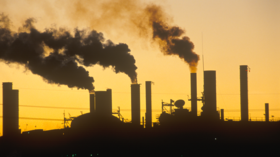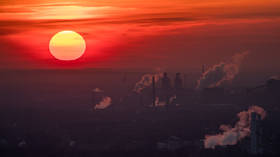
Researchers have warned that devastating floods and wildfires could be a “new normal” if greenhouse gas emissions aren’t capped

Factory at sunset in Cleveland, Ohio © Getty Images / Joe Sohm/Visions of America/Universal Images Group via Getty Images
EU scientists have declared that 2023 is set to be the warmest year recorded in the past 125,000 years, after data from last month showed that October had shattered previous temperature records.
“The [October] record was broken by 0.4 degree Celsius, which is a huge margin,” Samantha Burgess, director of the EU’s Copernicus Climate Change Service (C3S), said on Wednesday, adding that unusual temperature data was “very extreme.”
The average surface air temperature for October was 1.7 degrees Celsius warmer than typical for the so-called pre-industrial period between 1850 and 1900, before humans began burning large amounts of fossil fuels, C3S said. The increased global temperatures this year are linked to man-made emissions, scientists say, as well as the naturally-occurring El Nino weather system, which warms surface waters in the eastern Pacific Ocean.
CS3 said in a statement that 2023 is “virtually certain” to break the previous record set in 2016, which was also an El Nino year.
The only other time on record in which global surface air temperatures exceeded expectations by such a large margin was September 2023. Researchers have indicated that extreme temperatures are expected to persist in 2024.


Read more
“When we combine our data with the IPCC (Intergovernmental Panel on Climate Change), we can say that this is the warmest year for the last 125,000 years,” Burgess said, adding that she was “really, really surprised” by the findings.
The uptick in global temperatures directly corresponds to an increase in human suffering, according to Dr. Friederike Otto from Imperial College London.
“Within this year, extreme heatwaves and droughts, made much worse by these extreme temperatures, have caused thousands of deaths, people losing their livelihoods, being displaced, etc.” he said, as per the BBC on Wednesday. “These are the records that matter.”
Scientists have blamed man-made climate change for a series of disasters which have happened throughout 2023, including floods that killed thousands in Libya, South American heatwaves and Canada’s worst-ever season of forest fires — which Piers Foster, a climate scientist at the UK’s University of Leeds, warned could become commonplace.
“We must not let the devastating floods, wildfires, storms, and heatwaves seen this year become a new normal,” he said via Reuters, explaining that by “rapidly reducing greenhouse gas emissions” the rate of warming can be halved.
The topic is expected to dominate the UN’s COP28 climate change summit, set to begin in Dubai on November 30.

